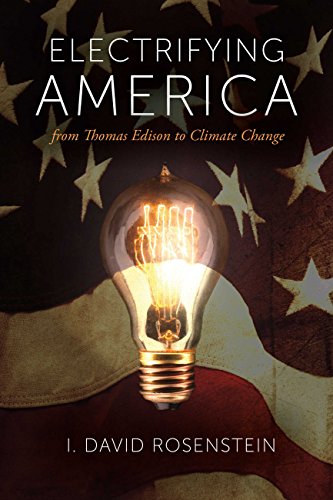
Electrifying America received a 4+ star review, making it an IndieReader Approved title.
Following find an interview with author I. David Rosenstein.
The book is named Electrifying America: From Thomas Edison to Climate Change. It was published on June 25, 2017.
What’s the book’s first line?
The first line is: “In the mid 19th century, before electricity was available, daily life in America was physically backbreaking and horribly repetitive.”
What’s the book about? Give us the “pitch”.
The book uses a reader-friendly storytelling approach to describe the evolution of electric service in America starting with Edison’s discovery of the light bulb and continuing through today’s efforts to reduce carbon emissions from fossil-fueled generation plants. It shows how the electric industry has been able to overcome numerous crises throughout its history to continue to deliver reliable and affordable electricity to homes and businesses in America.
What inspired you to write the book? A particular person? An event?
I was an attorney who specialized in electric utility law for almost 40 years. During that time I had the opportunity to participate in many public forums where members of the public sought to register their anger towards electric utilities. The cause of their anger might have been a proposed rate increase or the noise or emissions coming from their local generating plants. It always struck me that those who were trying to effect change in the industry would have been far more effective if they had a basic understanding of how utilities work and how they are regulated. I wrote this book to try to give that basic understanding.
What’s the main reason someone should really read this book?
I think that anyone who has an interest in how they get their electric service would have an interest in reading this book. If they are activists who want to effect change in the industry they can use the information in this book (and at the companion website) to make their efforts more successful.
When did you first decide to become an author?
I had been thinking about a book like this throughout most of my 40 years in the electric utility industry. When I retired I finally had time to convert my thoughts into book form.
Is this the first book you’ve written?
Yes, this is the first book I have written.
What do you do for work when you’re not writing?
Before I retired I was an attorney in the electric utility industry. For the first 20 years of my career I was in private practice representing electric customers in opposition to utilities who were seeking rate increases at state regulatory agencies throughout the country. After the industry deregulated in the mid-1990s I left private practice and went to work as a General Counsel for a company that produced and sold electricity in the deregulated markets.
How much time do you generally spend on your writing?
When I was writing this book I spent several hours a day in front of my computer and the rest of the day arranging my thoughts while going about my other daily activities.
What’s the best and the hardest part of being an indie?
My goal in writing this book was to get the information I had to share out to as many people as possible as quickly as possible. I worked with an editor to refine the content and make it understandable. But I did not want to spend time working with an agent or publisher.
What’s a great piece of advice that you can share with fellow indie authors?
Spend the money on a good editor. No matter how many times you read your draft and think you have a good product you need a fresh pairs of eyes to read it and challenge you.
Would you go traditional if a publisher came calling? If so, why?
At this point I probably would consider going traditional. While I met my goal of getting the book out on a timely basis and at a reasonable price my efforts to get widespread readership have been challenged by having to publicize the book without a publisher.
Is there something in particular that motivates you?
I have probably known hundreds of professionals in the electric utility industry throughout my career. I would like to think that most of them think of me as someone who was committed to my work and did a fairly good job representing my clients. Writing this comprehensive history of the industry was something of a risk for me. If it came out poorly my former colleagues might change their opinion of me and remember me as “that fool who thought he could write a book.” What motivated me while writing the book was making sure that it was of a high quality so that I would not be thought of as “that fool.”
